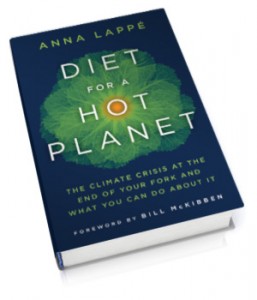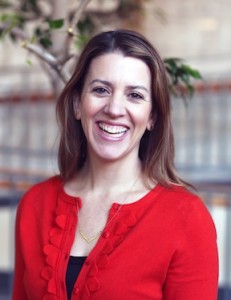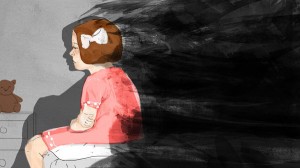by Rona | Dec 2, 2015 | Uncategorized
If you missed the conversation about the food and climate connection on “About Health” on KPFA.org 94.1FM, you can hear it now at https://kpfa.org/player/?audio=219892
We were joined by ANNA LAPPÉ, author of Diet for a Hot Planet and NAVINA KHANNA, Field Director of Live Real. How does the way we eat, grow, and buy food impact our planet, and what can each of us do about it?
This is a ripe time to be talking about the climate crisis, food, and health.
“With seven principles for a climate-friendly diet and success stories from sustainable food advocates around the globe, Anna Lappé offers a vision of a food system that can be part of healing the planet. An engaging call to action, Diet for a Hot Planet delivers a hopeful message during troubling times.”
Guests:
 Anna Lappé is a widely respected author and educator, known for her work as an expert on food systems and as a sustainable food advocate. Anna is a founding principal of the Small Planet Institute. She is currently the head of the Real Food Media Project, a new initiative to spread the story of the power of sustainable food using creative movies, an online action center, and grassroots events. – http://smallplanet.org/about/anna/bio#sthash.5TEVN3ma.dpuf
Anna Lappé is a widely respected author and educator, known for her work as an expert on food systems and as a sustainable food advocate. Anna is a founding principal of the Small Planet Institute. She is currently the head of the Real Food Media Project, a new initiative to spread the story of the power of sustainable food using creative movies, an online action center, and grassroots events. – http://smallplanet.org/about/anna/bio#sthash.5TEVN3ma.dpuf
Navina Khanna is an organizer based in Oakland, CA and a Fellow  at Movement Strategy Center. She has dedicated over 15 years to creating a more just and sustainable world through transforming food systems. With a background in sustainable agriculture and food justice, she’s worked as an educator, community organizer, and policy advocate, and is currently building a national cross-sector food and farm justice coalition called HEAL Food Alliance (Health, Environment, Agriculture, Labor). Navina serves on the Boards of Food Policy Action and Richmond’s Urban Tilth. A first-generation South Asian American, Navina’s worldview is shaped by growing up – and growing food – in India and the U.S. Also check out http://www.plateoftheunion.com/
at Movement Strategy Center. She has dedicated over 15 years to creating a more just and sustainable world through transforming food systems. With a background in sustainable agriculture and food justice, she’s worked as an educator, community organizer, and policy advocate, and is currently building a national cross-sector food and farm justice coalition called HEAL Food Alliance (Health, Environment, Agriculture, Labor). Navina serves on the Boards of Food Policy Action and Richmond’s Urban Tilth. A first-generation South Asian American, Navina’s worldview is shaped by growing up – and growing food – in India and the U.S. Also check out http://www.plateoftheunion.com/
by Rona | Mar 3, 2015 | Uncategorized
“In the 1980s, Dr. Vincent Felitti, now director of the California Institute of Preventive Medicine in San Diego, discovered something revolutionary about the ripple effects of child sexual abuse. He discovered it while trying to solve a very different health problem: helping severely obese people lose weight.” Please listen to this NPR story, and don’t forget to talk to someone you trust if it reminds you of some of the things you faced as a child.
http://www.npr.org/blogs/health/2015/03/02/377569413/can-family-secrets-make-you-sick

We know that Adverse Childhood Experiences (ACEs) have life-long consequences. ACEs (such as child sexual abuse, neglect, and domestic violence) cause suffering and emotional pain, and many physical ailments throughout a person’s life span.
Finally, the profound study done by Dr. Vincent Felitti, is now making the news and getting attention. One of the reasons it got ignored by many for so long is that his results pointed to the consequences of sexual abuse in children—not a subject many people want to talk about. This is something he said to me when I interviewed him on Childhood Matters, over 10 years ago. http://www.nurserona.com/the-relationship-between-adverse-childhood-experiences-and-adult-health/ Also on this radio show is Rhonda James when she was at Community Violence Solutions.
Imagine a time when all doctors asked their patients about their ACEs score, and tailored their health care to their real needs.
Now, thanks to many organizations, people are talking about ACEs and implementing policies that are trauma informed. Below are some links that report on work that is being done.
Each of us can spend time reflecting on our own ACE score, and notice how we have healed, and where we still need support in order to live a full and healthy life.
And as parents, we can help to repair some of the trauma that our children suffered. It’s never to late to reach out to others with compassion and love, and to practice self-compassion as well.
I’m deeply grateful to the people in my life who have helped me heal.
Nurse Rona
Watch this passionate TED talk done by Dr. Nadine Burke Harris, a Pediatrician in the Bayview in S.F. and a national spokesperson for ACEs.
http://www.ted.com/talks/nadine_burke_harris_how_childhood_trauma_affects_health_across_a_lifetime
Centers for Disease Control and Prevention:
http://www.cdc.gov/violenceprevention/acestudy/about.html
http://vetoviolence.cdc.gov/apps/phl/resource_center_infographic.html
http://www.npr.org/blogs/health/2015/03/02/387007941/take-the-ace-quiz-and-learn-what-it-does-and-doesnt-mean
Join ACEs Connection for daily stories from around the country. You will be inspired by what people are doing. http://www.acesconnection.com/home
by Rona | Nov 19, 2013 | Uncategorized
Take the time to plan for a yelling free holiday season.
How can you reduce your stress and maybe do less? What do you need to refuel? Can you slow down, pause, breath, calm yourself, and notice what is needed? Forgive yourself when you loose it, and see what behaviors set you off. Plan ahead, and be grateful for what you have. Each day is an opportunity to start fresh and connect with your kids.
Listen to Christine Carter and Nurse Rona talk about Yelling Less:http://www.nurserona.com/category/podcasts/
by Rona | Jan 9, 2013 | Appearances, Uncategorized
Was That Me Yelling? Yelling can be caused by many things such as stress, fatigue, frustration, anger, or temperament differences. Most parents agree that yelling isn’t beneficial, but report that they just don’t know what to do when their children misbehave. We will discuss how to come up with a plan and learn more about what triggers your yelling. It’s nice to know you’re not alone!
Date: Wednesday, January 23rd, 2013
Time: 7-9PM
Age Group: Preschool through Elementary
Place: Parents Place, 1710 Scott Street, San Francisco
Price: $35
For mor information and to register go to: http://www.parentsplaceonline.org/san-francisco/classes/yelling
by Rona | Jul 6, 2012 | Uncategorized
July 6, 2012: It’s terrific that my new web site is launched. You can find out about my services, who I am, and what I’ve been up to. In the coming months I’ll be adding more content for parents. We will transfer all of the Childhood Matters radio shows (from 2002-2012) and other podcasts for you to listen to when you can. I’ll also transfer the parenting resources that you can now find at www.childhoodmatters.org. (more…)

 Anna Lappé is a widely respected author and educator, known for her work as an expert on food systems and as a sustainable food advocate. Anna is a founding principal of the Small Planet Institute. She is currently the head of the Real Food Media Project, a new initiative to spread the story of the power of sustainable food using creative movies, an online action center, and grassroots events. – http://smallplanet.org/about/anna/bio#sthash.5TEVN3ma.dpuf
Anna Lappé is a widely respected author and educator, known for her work as an expert on food systems and as a sustainable food advocate. Anna is a founding principal of the Small Planet Institute. She is currently the head of the Real Food Media Project, a new initiative to spread the story of the power of sustainable food using creative movies, an online action center, and grassroots events. – http://smallplanet.org/about/anna/bio#sthash.5TEVN3ma.dpuf at Movement Strategy Center. She has dedicated over 15 years to creating a more just and sustainable world through transforming food systems. With a background in sustainable agriculture and food justice, she’s worked as an educator, community organizer, and policy advocate, and is currently building a national cross-sector food and farm justice coalition called HEAL Food Alliance (Health, Environment, Agriculture, Labor). Navina serves on the Boards of Food Policy Action and Richmond’s Urban Tilth. A first-generation South Asian American, Navina’s worldview is shaped by growing up – and growing food – in India and the U.S. Also check out http://www.plateoftheunion.com/
at Movement Strategy Center. She has dedicated over 15 years to creating a more just and sustainable world through transforming food systems. With a background in sustainable agriculture and food justice, she’s worked as an educator, community organizer, and policy advocate, and is currently building a national cross-sector food and farm justice coalition called HEAL Food Alliance (Health, Environment, Agriculture, Labor). Navina serves on the Boards of Food Policy Action and Richmond’s Urban Tilth. A first-generation South Asian American, Navina’s worldview is shaped by growing up – and growing food – in India and the U.S. Also check out http://www.plateoftheunion.com/
 . There are many ways to reduce emotional suffering and treat the ills that millions of people face each year.
. There are many ways to reduce emotional suffering and treat the ills that millions of people face each year. 